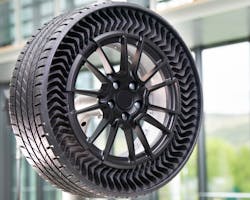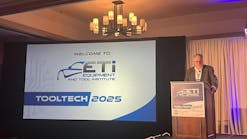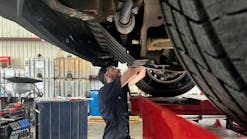Michelin, GM announce prototype airless tire
Michelin and General Motors presented a new generation of airless wheel technology for passenger vehicles, the Michelin Uptis Prototype (or “Unique Puncture-proof Tire System”), at the Movin’On Summit for sustainable mobility.
Michelin and GM also announced a joint research agreement under which the companies intend to validate the Uptis Prototype with the goal of introducing Uptis on passenger models as early as 2024.
Michelin and GM are testing the Uptis Prototype, beginning with vehicles like the Chevrolet Bolt EV. Later this year, the companies will initiate real-world testing of Uptis on a test fleet of Bolt EV vehicles in Michigan.
Because Uptis is airless, the breakthrough wheel assembly eliminates the dangerous risk of flat tires and blowouts:
- Drivers of passenger vehicles feel safer on the road.
- Operators of passenger vehicle fleets minimize downtime and improve efficiency resulting from flat tires and near-zero levels of maintenance.
- Society at large benefits from extraordinary environmental savings through reduced use of raw materials for replacement tire or spare tire production.
The Uptis Prototype represents a major advancement toward achieving Michelin’s VISION concept, which was presented at the Movin’On Summit in 2017 as an illustration of Michelin’s strategy for research and development in sustainable mobility. The VISION concept introduced four main pillars of innovation: airless, connected, 3D-printed, and 100 percent sustainable (entirely renewable or bio-sourced materials).
“Uptis demonstrates that Michelin’s vision for a future of sustainable mobility is clearly an achievable dream,” said Florent Menegaux, chief executive officer for Michelin Group. “Through work with strategic partners like GM, who share our ambitions for transforming mobility, we can seize the future today.”
“General Motors is excited about the possibilities that Uptis presents, and we are thrilled to collaborate with Michelin on this breakthrough technology,” said Steve Kiefer, senior vice president, global purchasing and supply chain, General Motors. “Uptis is an ideal fit for propelling the automotive industry into the future and a great example of how our customers benefit when we collaborate and innovate with our supplier partners.”
The Uptis Prototype is re-engineered for today’s passenger vehicles, and it is also well suited to emerging forms of mobility. The vehicles and fleets of tomorrow — whether autonomous, all-electric, shared service, or other applications — will demand near-zero maintenance from the tire to maximize their operating capabilities.
“The Uptis Prototype demonstrates Michelin’s capacity for innovation — in both the mastery of these high-tech materials, and also the development approach in close collaboration with GM, which validates our Vision concept as a roadmap for innovation,” said Eric Vinesse, executive vice president, research and development, Group Michelin, who revealed Uptis at the Movin’On Summit. “Uptis represents progress toward Michelin’s vision for tomorrow’s mobility, and also embodies our commitment to a better, sustainable mobility for all.”
Uptis features improvements in architecture and composite materials, which enable Uptis to bear the car’s weight at road-going speeds.
These innovations combine to eliminate compressed air to support the vehicle’s load, and result in environmental savings: approximately 200 million tires worldwide are scrapped prematurely every year as a result of punctures, damage from road hazards, or improper air pressure that causes uneven wear, according to the company.
These advancements through the Uptis Prototype demonstrate Michelin’s and GM’s shared commitment to delivering safer, more sustainable mobility solutions.


